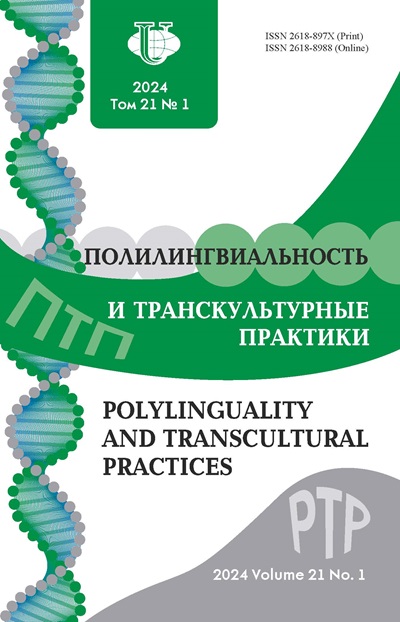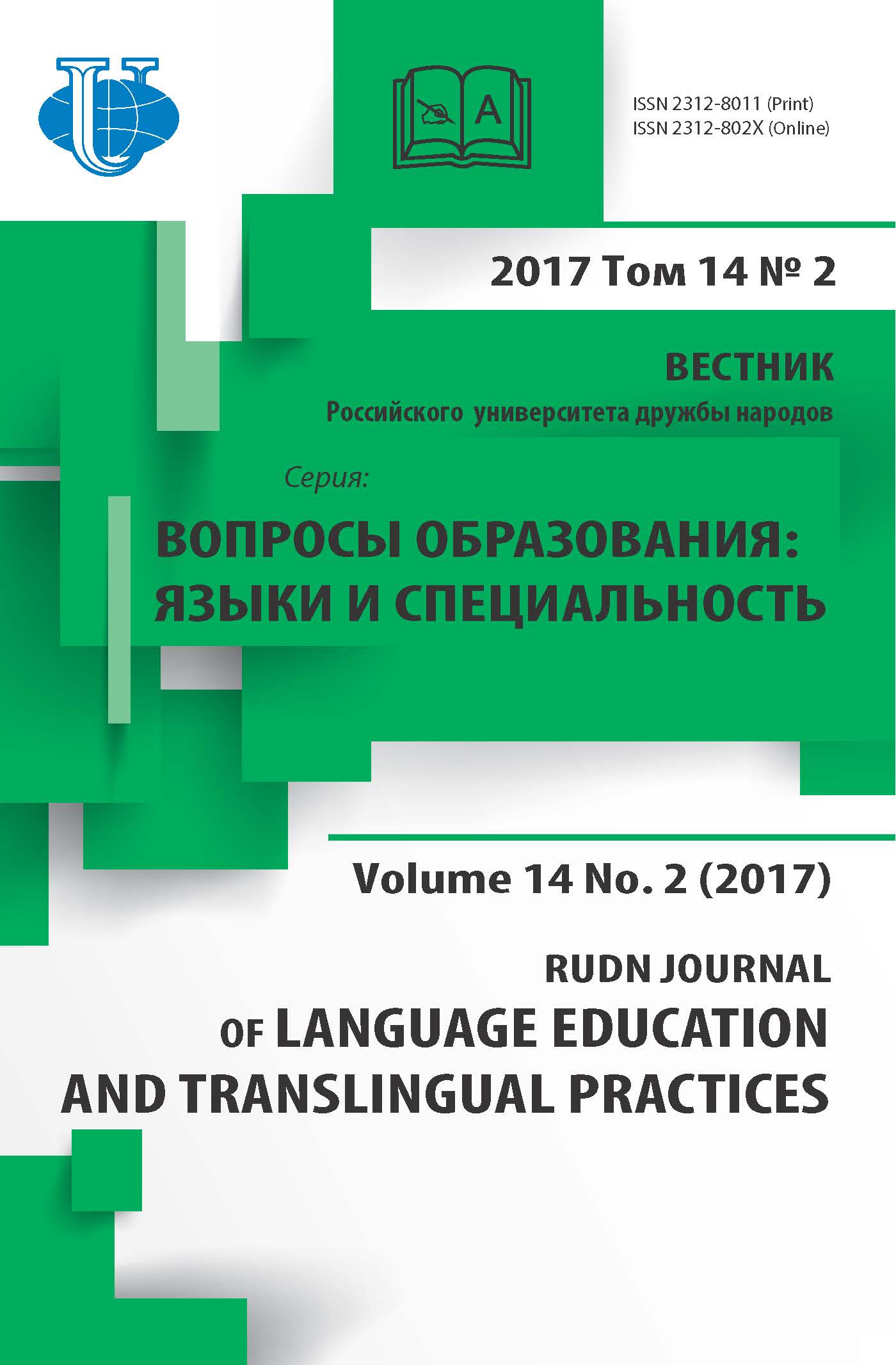TRANSLINGUALISM AND ITS APPLICATION
- Authors: Proshina ZG1
-
Affiliations:
- Lomonosov Moscow State University
- Issue: Vol 14, No 2 (2017)
- Pages: 155-170
- Section: LANGUAGES IN CONTACT: THEORY AND PRACTICE
- URL: https://journals.rudn.ru/polylinguality/article/view/16551
- DOI: https://doi.org/10.22363/2312-8011-2017-14-2-155-170
Cite item
Full Text
Abstract
The article dwells on the concepts of translingualism and transculturalism that are under wide discussion now. The author reveals the reasons for the emergence of the terms and differentiates them from synonymic designations. Based on the quantitative analysis by means of the Google search in the internet corpus of texts, the author demonstrates the usage of these terms and their synonymic designations, as well as their relationship to certain types of discourse. A brief review of domains the terms are used in is provided: in sociolinguistics, literature studies, pedagogy, applied linguistics, translation studies, and advertisement.
About the authors
Z G Proshina
Lomonosov Moscow State University
Author for correspondence.
Email: proshinazoya@yandex.ru
доктор филологических наук, профессор кафедры теории преподавания иностранных языков МГУ им. М.В. Ломоносова
Lomonosovsky Avenue, 31, Bld. 1, Moscow, Russia, 119192References
- Gasanova N.K. Multiculturalism as a symbiosis of cultures. URL: http://cyberleninka.ru/article/n/multikulturalnost-kak-simbioz-kultur (accessed: 15.12.2016).
- Zvjaginceva E.P., Valiahmetova L.V. Fenomen polikul’turnosti, ego idei i principy v obrazovatel’nom prostranstve sovremennoj Rossii [Phenomenon of polyculturality, its ideas and principles in the educational space of modern Russia]. Zhurnal nauchnyh publikacij aspirantov i doktorantov. 2014. Available at: http://jurnal.org/articles/2014/ped2.html (accessed: 14.12.2016).
- Bezrukova V.S. Osnovy duhovnoj kul’tury: jenciklopedicheskij slovar’ pedagoga. Ekaterinburg, 2000. 937 p.
- Flier A. Ja. Mul’tikul’tural’nost’. Available at: www.ifapcom.ru/files/Monitoring/flier_multiculturality.pdf (accessed: 15.12.2016).
- Levikova S.I. Mul’tikul’turalizm kak social’naja problema, ili chem otlichaetsja «Mul’tikul’turalizm» ot «Polikul’turnosti» [Multiculturalism as a social problem, or what differs ‘multiculturalism’ from ‘polyculturalty’]. Izvestija VGPU. 2014. № 3 (88). Pp. 37—41. Available at: http://cyberleninka.ru/article/n/multikulturalizm-kak-sotsialnaya-problema-ili-chem-otlichaetsya-multikulturalizm-ot-polikulturnosti (accessed: 14.12.2016).
- Medvedev rasskazal o rossijskom mul’tikul’tarizme [Medvedev spoke on Russian multiculturalism]. Aktual’nye kommentarii. 9 Sept. 2011. Available at: http://actualcomment.ru/medvedev_rasskazal_o_rossiyskom_multikulturalizme.html (accessed: 11.12.2016).
- Tlostanova M.V. Ot filosofii mul’tikul’turalizma k filosofii transkul’turacii [From multiculturalism philosophy to transculturation philosophy]. M.: RUDN, 2008. 251 p.
- Kolesnikov A.S. Vozmozhna li interkul’turnaja filosofija? [Is there intercultural philosophy?] Vestnik RHGA. 2009. Vol. 10. № 3. Available at: http://cyberleninka.ru/article/n/vozmozhna-li-interkulturnaya-filosofiya (accessed: 13.10.2016).
- Guilherme M. and Dietz G. Difference in diversity: multiple perspectives on multicultural, intercultural, and transcultural conceptual complexities.Journalof Multicultural Discourses. 2015. Vol. 10. No. 1. Pp. 1—21.
- Zhukova I.N. Slovar’ terminov mezhkul’turnoj kommunikacii [Dictionary of intercultural communication terms] / I.N. Zhukova, M.G. Lebed’ko, Z.G. Proshina, N.G. Juzefovich; ed. by M.G. Lebed’ko i Z.G. Proshinoj. M.: Flinta; Nauka, 2013. 632 p.
- Paniotova T.S. Kul’turnaja istorija Zapada v kontekste modernizacii (XIX — nachalo XXI v.) [Cultural history of the West in the context of modernization (19-early 20th c.)]: monografija. M.; Berlin: Direct-Media, 2014. 223 p. Available at: https://books.google.ru/books?id=5yM0CwAAQBAJ&printsec=frontcover&hl=ru#v=onepage&q&f=false (accessed: 20.12.2016).
- Alieva N.N. Krosskul’turnost’ kak metodologija izuchenija vtorogo jazyka v sovremennoj lingvodidaktike [Crossculturalness as a method to study a second language in modern applied linguistics]. Izvestija RGPU im. A.I. Gercena. 2007. № 28. Pp. 7—13. Available at: http://cyberleninka.ru/article/n/krosskulturnost-kak-metodologiya-izucheniya-vtorogo-yazyka-v-sovremennoy-lingvodidaktike (accessed: 15.12.2016).
- Bergel’son M.B. Mezhkul’turnaja kommunikacija kak issledovatel’skaja programma: lingvisticheskie metody issledovanija kross-kul’turnyh vzaimodejstvij [Intercultral communication as a research project: linguistic methods of exploring crosscultural interactions]. Vestnik MGU. Ser. 19: Lingvistika i mezhkul’turnaja kommunikacija. 2001. № 4. Pp. 166—181.
- Larina T.V. Kategorija vezhlivosti i stil’ kommunikacii. Sopostavlenie anglijskih i russkih lingvokul’turnyh tradicij. [Politeness category and communication style. Comparison of English and Russian linguacultural traditions]. M.: Jazyki slavjanskih kul’tur, 2009. 512 p.
- Golovanivskaja M.K. Francuzskij mentalitet s tochki zrenija nositelja russkogo jazyka. [French mentality viewed by a Russian speaker]. M.: Izd-vo Mosk. un-ta, 1997. 279 p.
- Ortiz F. Cuban Counterpoint: Tobacco and Sugar. Spanish edition. / Transl. into English by Harriet de Onis. New York: Knopf, (1940) 1947. Reprint: Durham, NC, and London: Duke University Press Books, USA, 1995. 408 p.
- Tlostanova M.V. Postsovetskaja literatura i estetika transkul’turacii. Zhit’ nikogda, pisat’ niotkuda [Post-Soviet literature and transculturation aesthetics. Never to live and to write from nowhere]. M.: Editorial URSS, 2004. 416 p.
- Rekosh K.H. Jazykovaja politika v Evrope — Vavilone XXI veka [Language policy in Europe — Babylon of the 21stc.] Vestnik MGIMO. 2014. № 3 (36). Pp. 224—231. Available at: http://www.vestnik.mgimo.ru/sites/default/files/pdf/026_filologiya_02_rekoshkh.pdf (accessed: 21.12.2016).
- Ponomareva O.B. Strategija mul’tilingvizma i izuchenija inostrannyh jazykov v Evrosojuze [Multiculturalism and learning foreign languages strategy]. Vestnik Tambovskogo universiteta. Ser. Filologicheskie nauki i kul’turologija. 2015. Issue 2 (2). Pp. 23—28.
- Filimonova O.E. “Chuzhoj jazyk” v pojeticheskom tekste [‘Foreign language’ in a poetic text].Studia Linguistica XX. Jazyk v logike vremeni: nasledie, tradicii, perspektivy. SPb.: Politehnika-servis, 2011. Pp. 184—195. Available at: ephil.herzen.spb.ru/wp-content/uploads/2011/07/studiaxx.pdf (accessed: 21.12.2016).
- Grinberg A.S., Gorbachev N.N. Problemy otchuzhdenija znanij v processe formirovanija informacionnyh resursov i zapasov [Problems of estrangening knowledge in forming informational resources]. Informacionnye tehnologii v sisteme obrazovanija, agropromyshlennosti, birzhevoj sisteme. Zashhishhennye informacionnye sistemy organov gosudarstvennogo upravlenija i social’noj sfery. Available at: www.belisa.org.by/pdf/PTS2005/111-115.pdf (accessed: 21.12.2016).
- Selinker L. Interlanguage.International Review of Applied Linguistics. 1972. No. 10. Pp. 209—241.
- Canagarajah S. Multilingual writers and the academic community: towards a critical relationship. Journal of English for Academic Purposes. 2002. No. 1. Pp. 29—44.
- Lee Jerry Won. Transnational linguistic landscapes and the transgression of metadiscursive regimes of language.Critical Inquiry in Language Studies. 2014. Vol. 11. № 1. Pp. 50—74.
- Pennycook A. Global Englishes and transcultural flows. London and New York: Routledge, 2007. 189 p.
- Canagarajah S. Translingual Practice: Global Englishes and Cosmopolitan Relations. London, New York: Routledge, 2013. 224 p.
- Celic С. and Seltzer K. Translanguaging: A CUNY-NYSIEB Guide for Educators. New York: The City University of New York, 2011. 184 p.
- García O. Countering the dual: Transglossia, dynamic bilingualism and translanguaging in education. In: Rubdi, R., Alsagoff, L. (eds.) The global-local interface and hybridity: Exploring language and identity. Bristol, Buffalo and Toronto: Multilingual Matters, 2014. Pp. 100—118.
- Garcia O., Wei L. Translanguaging: Language, Bilingualism and Education. New York: Palgrave Macmillan, 2014. 175 p.
- Session 2: What is translanguaging? Available at: https://www.youtube.com/watch?v=Z_AnGU8jy4o (accessed 1.12. 2016).
- To translanguage or not to translanguage? How to ... / Dr. Ofelia Garcia. URL:https://www.youtube.com/watch?v=uk0ygruQ7pw (accessed 1.12. 2016).
- Canagarajah S. Translanguaging in the classroom: Emerging issues for research and pedagogy. Applied Linguistics Review. 2011. Vol. 2. No. 1. Pp. 1—28.
- Suresh Canagarajah on Translingualism: A Four Part Interview, Part I. Available at: https://www.youtube.com/watch?v=3e4fML8aDS4 (accessed: 1.12. 2016).
- Kachru B.B. The bilingual’s creativity: Discoursal and stylistic strategies in contact literatures in English. Studies in the Linguistic Sciences. 1983. Vol. 13. No. 2. Pp. 37—55.
- Gasanova I.M. Jazykovye sredstva izobrazhenija samoidentifikacii lichnosti v postkolonial’nom romane XX—XXI vv. [Language means of depicting personality’s self-identificationin the postcolonial novel of 20th-21stcc.] Diss. … kand. filol. nauk. SPb., 2013. 22 p.
- Sidorova O.G. Britanskij postkolonial’nyj roman poslednej treti XX veka v kontekste literatury Velikobritanii [British postcolonial novel of the 1970—2000 in the context of Great Britain’s literature]: dis. … d-ra filol. nauk. M., 2005. 333 p.
- Dawson-Varughese E. New departures, new worlds: World Englishes literature. English Today. 2012. Vol. 28. No. 1. Pp. 15—19.
- Thumboo E. Literary creativity in world Englishes. The Handbook of World Englishes / B. Kachru, Y. Kachru, С. Nelson (eds.). Malden, MA, USA; Oxford, UK: Victoria, Australia: Wiley-Blackwell, 2006. Pp. 405—427.
- Trivedi M. World Englishes and World Englishes Literature: A critical study.Cognitive Discourses. International Multidisciplinary Journal. 2013. Vol. 1. No. 3. URL: http://cdimj.naspublishers.com/vol_1Issue_3.html (accessed:4.08.2015).
- Kellman S.G. Switching languages: translingual authors reflect on their craft. Lincoln and London: University of Nebraska Press, 2003. 339 p.
- Blommaert J. The sociolinguistics of globalization. Cambridge and New York: Cambridge University Press, 2010. 229 p.
- Karakuc-Borodina L.A. Translingvizm i jazykovaja igra (na materiale proizvedenij V.V. Nabokova) [Translingualism and language play (based on V. Nabokov’s works)]. Vestnik SPbGU. Serija 9. Filologija. Vostokovedenie. Zhurnalistika. 2007. № 3-II. Pp. 151—155. Available at: http://cyberleninka.ru/article/n/translingvizm-i-yazykovaya-igra-na-materiale-proizvedeniy-v-v-nabokova-1 (accessed: 21.12.2016).
- Stromberg D. Russian as an American Language: A Conversation with Anya Ulinich. ZEEK archive. Available at: www.zeek.net/703book/index.php?page=2 (accessed:21.12.2016).
- Rivlina A.A. Formirovanie global’nogo anglo-mestnogo bilingvizma i usilenie translingval’noj praktiki [Global English — local bilingualism formation and the increase of translingual practice]. Social’nye i gumanitarnye nauki na Dal’nem Vostoke. 2016. Vol. 50. № 2. Pp. 22—29.
- Rivlina A. Bilingual creativity in Russia: English-Russian language play. World Englishes. 2015. Vol. 34. No. 3. Pp. 436—455.
- Proshina Z.G. Peredacha kitajskih, korejskih i japonskih slov pri perevode s anglijskogo jazyka na russkij i s russkogo jazyka na anglijskij. Teorija i praktika oposredovannogo perevoda. M.: AST: Vostok-Zapad, 2005 (2007). 160 p.
- Problemy i perspektivy translingval’nyh i transkul’turnyh kontaktov [Problems and perspectives of translingual and transcultural contacts]. Spec. issue of the journal “The Humanities and Social Studies in the Far East” / Ed. by Z.G. Proshina. 2016. № 2 (50). Pp. 6—164.
- Pennycook A. Translingual English.Australian Review of Applied Linguistics, International Forum on English as an International Language, special forum issue / Ed. by Farzad Sharifian and Michael Clyne. 2008. Vol. 32. No. 3. Pp. 30.1—30.9.















